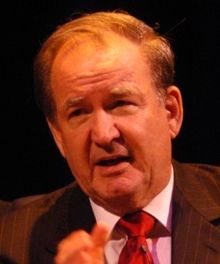An editor has nominated this article for deletion. You are welcome to participate in the deletion discussion , which will decide whether or not to retain it. |

This is the electoral history of Pat Buchanan . Buchanan served as an advisor to three United States presidents: Richard Nixon, Gerald Ford, and Ronald Reagan. He then became a conservative columnist and co-hosted Crossfire , a political program on CNN.
Contents
- Presidential primaries (1992)
- Presidential primaries (1996)
- Popular vote
- Delegate count
- Presidential primaries (2000)
- Popular vote 2
- Delegates
- 2000 United States presidential election
- References
In 1992, never before having sought elected office, Buchanan challenged incumbent president George H. W. Bush for the Republican Party presidential nomination. Buchanan lost each contest, but received nearly 40 percent of the vote in the New Hampshire primary and ultimately received about 23 percent of the primary vote. [1] He again sought the GOP presidential nomination in 1996, winning three contests and garnering almost 21 percent of the vote; Kansas Senator Bob Dole ultimately won the party's nomination. [2]
Buchanan left the Republican Party in 1999 and joined the Reform Party, founded by two-time independent presidential candidate Ross Perot. He received more than 25 percent of the popular vote in the primary, then secured the nomination at the convention, selecting conservative activist Ezola Foster for his running mate. [3] [4] The Buchanan-Foster ticket received the fourth-most popular votes in the 2000 United States presidential election, though failing to secure any votes in the Electoral College.


